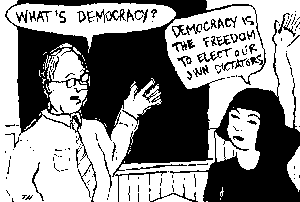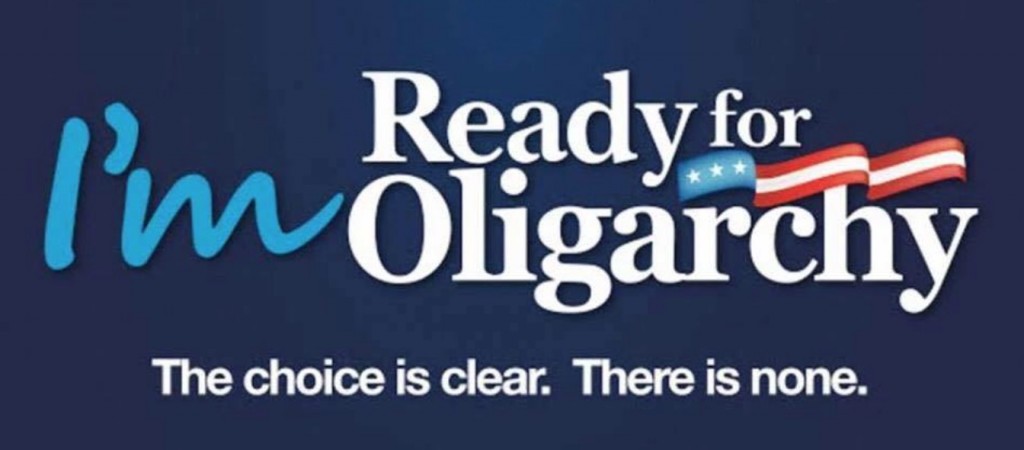Now that the conventions are over and the two major parties have thrown their soirees, a number of Americans with a bad taste in their mouth are questioning their options. Many are looking to the “third party” candidates, but given that America has been a 2 party system since its first election, the majority see them as wasted votes in the presidential race. Given that the tournament of the election cycle has delivered two primary candidates many people don’t trust and feel disinclined to vote for, some are even saying democracy has failed us. It may be true if we actually had a democracy.
Of course, people are also saying democracy has failed in Thailand, after they overcame the military in 1982 only to be overthrown by the military again in 2006. In the wake of Brexit, some are saying democracy has failed England as well. In America, now that 9% of the population has used our electoral process to nominate 2 of the most despised people in the country as our selections for leadership, it might be time to accept the staggering truth that we have never truly been a democracy. While we do participate in democratic processes every 2-4 years, in our early years those votes were contained within a republic, and in more recent years, those votes have been contained within an oligarchy.
The First United States Congress consisted of 26 Senators (and eventually 3 alternates) and 64 in the House of Representatives. At the time, these 90 men represented roughly 3 million people, actually comprising only .002% of the population. In 2015, the 535 members of Congress made up .00017% of the population of 319 million US citizens. Considering that half of that percentage is comprised of millionaires, it would seem the 5% of actual Americans who can claim to be millionaires, according to Credit Suisse Research‘s study, are getting a bit more representation than the rest of us.
In 2014, Professor Martin Gilens of Princeton University and Professor Benjamin Page of Northwestern University released a paper titled “Testing Theories of American Politics: Elites, Interest Groups, and Average Citizens” which refers to the United States as a “civil oligarchy,” quoting the book Oligarchy by Professor Jeffrey Winters, also of Northwestern University. The report begins with the announcement of what many of us have known for awhile, “Multivariate analysis indicates that economic elites and organized groups representing business interests have substantial independent impacts on US government policy, while average citizens and mass-based interest groups have little or no independent influence.” Using a unique data set that includes measures of the key variables for 1,779 policy issues, the study looked at 4 theoretical traditions in the study of American politics to find the United States usually practicing Economic-Elite Domination and Biased Pluralism, but not so much Majoritarian Electoral Democracy or Majoritarian Pluralism.
“Americans do enjoy many features central to democratic governance,” say Gilens and Page at the end of their report, “such as regular elections, freedom of speech and association, and a widespread (if still contested) franchise. But we believe that if policymaking is dominated by powerful business organizations and a small number of affluent Americans, then America’s claims to being a democratic society are seriously threatened.”
 The recent presidential election, where we have the choice between a woman who charges millions of dollars just to speak and a man whose primary desire in life has been to make more money, is a living testament to Gilens’ and Page’s findings. The questions we should be asking ourselves as we move forward into the final stages of this spectator sport we know as politics should be based on which of these oligarchs has the greater ability to move us toward democracy, and what democracy really is in the first place. After all, over the last 240 years, we’ve deluded ourselves into thinking we actually have one when our Founding Fathers never really told us we did in the first place.
The recent presidential election, where we have the choice between a woman who charges millions of dollars just to speak and a man whose primary desire in life has been to make more money, is a living testament to Gilens’ and Page’s findings. The questions we should be asking ourselves as we move forward into the final stages of this spectator sport we know as politics should be based on which of these oligarchs has the greater ability to move us toward democracy, and what democracy really is in the first place. After all, over the last 240 years, we’ve deluded ourselves into thinking we actually have one when our Founding Fathers never really told us we did in the first place.
After the exhausting experience of declaring their independence, American leadership postponed the ratification of an operating procedure. Wanting to avoid puffed up governmental regulations, they believed the power to govern was a responsibility of the individual colonies more so than the national government. Yet in order to cultivate equal opportunity and income equality, they knew they had to get organized. The Articles of Confederation, which provided governmental guidelines, was deliberated upon for 5 years before being put into effect in 1781. They were ultimately deemed ineffective in organizing the economy due to the absence of a strong central government, each of the states wanting its own independence and sovereignty.
Washington criticized the weak government the Articles of Confederation offered, having watched his soldiers go hungry and without supplies due to its inefficiency. In addition, as a businessman and landowner, without a central government to organize the digging of canals and waterways he needed for trade routes, he was supportive of the move toward a rewrite. During the summer of 1787, Washington, Madison, and 55 other state delegates met initially to draft some amendments to the Articles of Confederation, but ended up scrapping the whole thing and coming up with the Constitution instead.
However not everyone wanted a big federal government. As one critic wrote in the Boston Gazette on November 26, 1787, “I had rather be a free citizen of the small republic of Massachusetts, than an oppressed subject of the great American empire.” Another critic, posting in the Philadelphia Independent Gazetteer on January 16, 1788, found it “astonishing that so flimsy and deceptive a doctrine should make converts among the enlightened freemen of America, who have so long enjoyed the blessings of liberty.”
The Articles of Confederation had limited a strong central government in order to more greatly empower the states to govern themselves, however, the Constitution left out descriptions of the individual states as “sovereign” and “independent” as the Articles had. Instead, the federal government became the law of the land to which all states would be subservient, even the former critics. As much as the states’ representatives feared the overwhelming rule of a federal government, those creating the federal government feared the overwhelming rule of the majority.
Although Adam Smith’s ideas were embraced as a great theory, and though the American Founding Fathers desired to empower the individual citizens of the new country to rise up in their virtues of industry and ambition, they were a little wary of giving the common man too much power. In discussing the development of a democracy for the Federalist Papers, James Madison wrote that democracies “have ever been spectacles of turbulence and contention; have ever been found incompatible with personal security or the rights of property; and have in general been as short in their lives as they have been violent in their deaths… A republic,” he declared, “by which I mean a government in which the scheme of representation takes place, opens a different prospect, and promises the cure for which we are seeking.”
The general consensus at the time was that common folk wouldn’t have the time, education, or common sense to vote on every little thing, and the citizenry would best be served by a republic, as had been utilized through the glory years of Rome, before it eventually fell under the weight of its collective Empire, and as England had done in their short time without a monarch. Madison went on to describe the role of the republic as an entity to “refine and enlarge the public views by passing them through the medium of a chosen body of citizens whose wisdom may best discern the true interest of their country and whose patriotism and love of justice will be least likely to sacrifice it to temporary or partial considerations. Under such a regulation it may well happen that the public voice, pronounced by the representatives of the people, will be more consonant to the public good than if pronounced by the people themselves, convened for the same purpose.”
“The picture of American society has, if I may so speak, a surface covering of democracy,” wrote Alexis de Tocqueville in Democracy in America, “beneath which the old aristocratic colors sometimes peep out.”
“If we take the term in the strict sense,” reasons Rousseau in The Social Contract, “there never has been a real democracy, and there never will be. It is against the natural order for the many to govern and the few to be governed. It is unimaginable that the people should remain continually assembled to devote their time to public affairs, and it is clear that they cannot set up commissions for that purpose without the form of administration being changed.”
Although America has since loudly and proudly declared itself to be a democracy for its citizens’ ability to vote on their representatives every 2 to 4 years, the word “democracy” is never mentioned in either the Declaration of Independence or the United States Constitution. In the case of America, our boisterousness about having a democracy was a bit premature. We’ve never truly had the technology to have a democracy before. However, there still stands the hope that we could have one if we want it.
The first step is to start local. Don’t get caught up in the hoopla of the national sensation of presidential candidates and the fabricated competition the 2 party system manufactures. The people who are going to most greatly affect you are the ones you have a greater chance of seeing where you live, in your city, in your county, and in your state.
The Federal Government was designed to help orchestrate economic trade. Considering the capabilities we have of global communication, now, it’s largely a lot of bluster and wastefulness. To develop a true democracy, to build a stronger economy, and to create a higher quality of life, we have got to tend better to the small stuff and start living local.
While the presidential race does have the cosmetic importance of whether we as a people (at least those of of who take part in the oligarchy) are at a point in our evolution where we could have elected the first woman, who also happens to have one of the most impressive resumes in the District of Columbia, albeit also one of the most mistrusted, or a silver-spooned bragadoccio, the epitome of what most people hate about capitalism. It will be interesting to find out who we truly are and what we hold dear, but as we move forward, if we actually want to participate in creating a democracy, our local votes will be the ones that matter most.
The preceding 1776 word essay contains excerpts from Money, Sex, Power & Faith.
Order your copy of Money, Sex, Power & Faith today!

